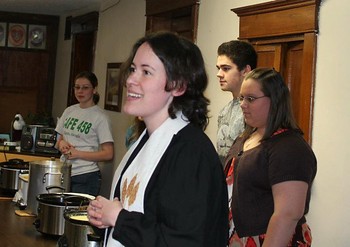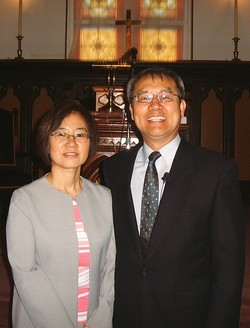Small churches can have big ministries.
Four years ago, the 36-member Lavonia (Georgia) Presbyterian Church had no children’s Sunday school. The church recently counted 12 children in the program.
Two years ago on Easter Sunday, nine people were baptized at the 156-member First Presbyterian Church in Vandalia, Missouri.
Both these congregations—their pastors and presbyteries—were among the original partners in the Presbyterian Mission Agency’s Small Church Residency Program. Since 2010 the program has transformed lives in geographically and culturally diverse, rural, small-town, and urban settings across the Presbyterian Church (U.S.A.)
And now, seven years after first recruiting, selecting, and sending its inaugural class of recent seminary graduates to serve hard-to-call churches across the denomination, the Small Church Residency Program—originally named "For Such a Time as This”—will come to a close.
In order to continue providing guidance and oversight to the pastoral residents commissioned last month at the national orientation in Louisville—as well as pastors who are at the mid-point of their respective residencies—the Small Church Residency Program will support its two current classes of pastoral residents through December 2017. Effective immediately it will no longer accept new applications from congregations or call-seekers.
“It has been so inspiring to see the Holy Spirit partner with seminary graduates and faithful Presbyterians to transform local congregations and communities,” said the Rev. Dr. Charles B. “Chip” Hardwick, director of the Presbyterian Mission Agency’s Theology, Formation, and Evangelism ministry area. “From the beginning, we always envisioned this as a pilot program, one that would help to create a sustainable model for resourcing our small churches with pastoral leadership. However, despite great efforts among mid-council staff and the Presbyterian Mission Agency, the program’s scope struggled to grow enough to justify continued investment.”

Rev. Elizabeth Campbell-Maleke blesses Souper Bowl of Caring meal. —Photo provided
Although the program was underwritten in large part in its first years by a substantial grant from an anonymous family foundation, which was not renewed, the decision to discontinue the program was not solely a financial one, but rather a combination of scope and financial factors.
Among the program’s funding commitments at the national level, participating pastoral residents had all their expenses paid to attend annual weeklong trainings in Louisville in the areas of church growth and transformation, leadership development and understanding small churches. In addition, participating congregations—although expected to be able to support a full-time pastor at the presbytery minimum salary—received $4,000 in salary support each year of their pastor’s two-year residency period.
Since the program’s inception, 43 recent seminary graduates have served 50 congregations in 20 presbyteries. Residency pastors have the option, with their congregations, to continue their pastorates beyond two years, which many have.
“The program provided me with the opportunity to grow and explore my calling in a safe environment,” said the Rev. Andy Sonneborn, a member of the class of 2013, who continues to serve in his original call to the First Presbyterian Churches in Colby and Hoxie, Kansas, a yoked parish in the Presbytery of Northern Kansas. “The congregation and I entered into the two-year designated term with a willingness to explore a new call and a new way of doing things. I also had a wonderful mentor and regional cluster group that provided support for me as I learned how to deal with problems and issues that arose in my call. The yearly gatherings provided me with a safe place to explore my fears and my concerns, as well my joys and accomplishments.”
The Rev. Cynthia Cushman, the Small Church Residency Program’s part-time coordinator will continue to support the program in a lessened capacity through December 2017. She said the program’s goals of developing missional pastors and growing small churches in spirit and in numbers have more than been met.
“The learnings from this program have been tremendous,” Cushman said. “The program has given our pastoral residents an appreciation for small church ministry, which has both informed and inspired the entire church. Because we are a denomination of primarily small-membership congregations, it is absolutely critical that we have and train leaders who understand and embrace the joys and the challenges of small church ministry.
The program has also inspired and created broader and more effective mentoring models for all teaching elders in many of its participating presbyteries. Western North Carolina Presbytery, for example, regularly sponsored and sent other small-church pastors—not in the program—at the presbytery’s own expense to attend the national orientation.
Heartland Presbytery, which has partnered with the program since its inaugural year, has experienced tremendous benefit from the Small Church Residency Program. The Rev. Jason Ku, who said the program helped him “to grow as a new pastor through the mentoring support and practical guidance, especially to cope with different cultures and traditions,” is still serving in his original call at First Presbyterian Church, Holden, Missouri.
“First, [the Small Church Residency Program] was a powerful object lesson for the whole presbytery of what could be accomplished in true partnership among the congregation, presbytery, and General Assembly,” said the Rev. Charles W. Spencer, executive presbyter of Heartland Presbytery. “The partnership in this program was concrete and measurable, with shared roles in training, supervision, support, and funding. Even our congregations that did not participate could look upon it and note that this was how a connectional church was supposed to work. Second, the new pastors indicated that the monthly cluster meeting was among the most helpful and meaningful elements of the program.”
Spencer said beginning in 2016, Heartland will attempt to create this element of the program for all its first-call pastors. “Offerings at the installation and ordination services of first-call pastors in Heartland will be designated toward funding a first-call cluster experience for all of our new pastors,” he said.

Rev. Jason Ku, pastor of First Presbyterian Church, Holden, Missouri, with his wife, Dongsook “Deborah” Ku. —Photo provided
In total, the Small Church Residency Program directly placed seven pastors in congregations in Heartland Presbytery, some of which had not had full-time resident pastors for a long time. “As other congregations observed the success of these congregations in securing fully-credentialed pastoral leadership, they explored their own creative mechanisms for calling a pastor,” said Spencer. “It would be difficult to quantify the number of congregations that stretched themselves to form yokes, be open to tent-makers, consider CREs, and take other creative efforts to secure pastoral leadership, having observed and been influenced by our congregations in the Small Church Residency Program.”
This August, the Rev. Joel Montgomery will celebrate three years of ministry at the First Presbyterian of Vandalia, Missouri, through the Small Church Residency Program. He similarly praised the new support model adopted by Missouri Union Presbytery as a direct result of the program.
“There were several benefits I experienced in this program as a first-call pastor,” said Montgomery. “First and foremost was the inclusion of mentoring, networking, and intentional pastoral development on both the presbytery and national levels. Having a mentor to look to for guidance and a group of colleagues across the country, with whom you can develop friendships and find support, is invaluable. The mentor group we’ve formed in our presbytery has been an incredible source of growth, not just for me, but for all the pastors whom we have incorporated into our cluster. It’s a reminder that we’re not alone in our ministries, an opportunity to have a safe place to explore ideas and work out struggles, and a place to encourage one another in our journeys.”
Montgomery added that another of the program’s significant benefits is the support it has given to small churches, which still face challenges.
“The barriers that existed when we started the Small Church Residency Program are still there,” said the Rev. Dr. Charles A. Wiley III, coordinator of the office of Theology and Worship. “Not only are hard-to-call churches are still hard to call, but too many of our churches are too small to afford a full-time pastor.”
Still, among congregations who can afford a full-time minister and are seeking pastors through the Office of the General Assembly’s Church Leadership Connection—the internet-based matching and referral system of the PC(USA)—many waited years without having any candidates apply.
“How to encourage ministry candidates to follow God’s call to underserved congregations continues to be a challenge for the whole church at all levels,” said Hardwick. “It is my hope that the learnings from the Small Church Residency Program will assist the PC(USA) in meeting the challenge in effective ways.”
Those who have followed God’s call through the program to serve small membership congregations say the experience has been fulfilling and worthy of celebration.
“I am thankful to the church and the vision and leadership of so many in making this program possible,” said the Rev. Elizabeth Campbell-Maleke, who has served the First Presbyterian Church of Williamstown and Waverly-Bethel Presbyterian Church, a yoked call in the Presbytery of West Virginia, since 2011. “I am grateful.”

